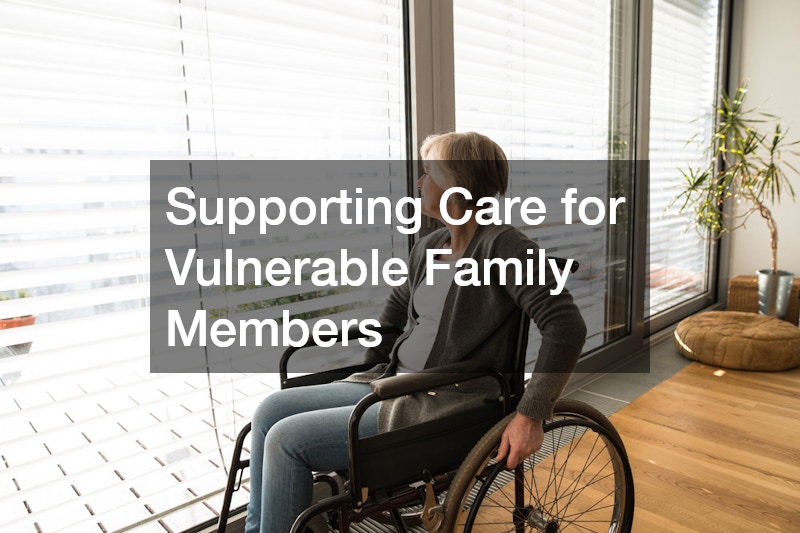Building Health for the Whole Family
A healthy family is the cornerstone of a happy home. The foundation of wellness extends beyond merely avoiding illness—it encompasses physical fitness, emotional resilience, and proactive care for each member, from the youngest child to grandparents. Families face unique challenges in maintaining health, including busy schedules, differing nutritional needs, and balancing mental and physical well-being. Incorporating simple, consistent routines into daily life can transform family health, ensuring everyone thrives together.
Daily habits, such as engaging in physical activities, consuming balanced meals, and fostering open communication, significantly impact overall wellness. Regular monitoring of health markers, prompt attention to symptoms, and preventive measures help reduce the risk of chronic diseases. Importantly, creating an environment where children and adults alike feel empowered to participate in their own health journey builds confidence and long-term commitment.
In addition to personal responsibility, families benefit from professional guidance. Accessing healthcare providers for routine check-ups, specialized therapies, or preventive care equips families with tailored strategies to address individual needs. Mental health, often overlooked, plays a crucial role in physical health. Families who nurture emotional support, encourage stress management, and practice mindfulness together see a noticeable difference in day-to-day functioning.
This guide explores twelve practical aspects of building family health. Each section emphasizes strategies to promote wellness, from physical activity to professional care, while highlighting local resources that can enhance your family’s health journey. By the end, readers will gain a comprehensive understanding of how to cultivate a robust, vibrant, and resilient family lifestyle.
1. Creating Active Family Routines
Encouraging children and adults to engage in consistent physical activity is critical for maintaining energy, improving cardiovascular health, and promoting mental well-being. Establishing weekly routines that include family walks, cycling, or playful competitions ensures everyone remains motivated while fostering connection. Structured activities such as gymnastics can help children develop flexibility, strength, and coordination, which lay the groundwork for lifelong physical competence.
Finding accessible programs that suit your family’s interests is essential. A local gymnastics class provides a structured environment for children to build strength, agility, and confidence under professional supervision. Beyond physical benefits, participating in group classes teaches teamwork, discipline, and perseverance, all valuable life skills. For parents, encouraging their children to attend classes and participating in family-friendly workouts reinforces the importance of maintaining an active lifestyle.
Regularly integrating these routines into daily life reduces sedentary habits, improves sleep quality, and enhances emotional regulation. Celebrating achievements, no matter how small, helps sustain motivation and makes physical activity a positive and enjoyable experience. Ultimately, establishing active routines equips families with tools to prevent obesity, boost mental health, and cultivate an environment where health is a shared priority.
2. Prioritizing Accessible Medical Support
Families benefit from having reliable medical resources readily available, ensuring that urgent health needs are addressed promptly. Quick access to healthcare can prevent minor issues from escalating into serious conditions, providing peace of mind for caregivers and children alike. Creating a list of trusted local clinics and knowing where to go for immediate care can streamline emergency responses and routine medical visits.
Utilizing a local walk in clinic ensures that family members receive timely evaluations, vaccinations, and treatment for common illnesses without long waits or appointments. These clinics often offer flexible hours, accommodating busy schedules and minimizing disruption to work and school routines. For families juggling multiple responsibilities, having a dependable walk in clinic provides reassurance that urgent care is never out of reach.
Additionally, developing a relationship with healthcare providers fosters continuity of care, allowing for more personalized treatment plans and preventive measures. Parents can seek advice on nutrition, child development, or chronic conditions, ensuring that every member’s health needs are consistently monitored. Prioritizing accessible medical support strengthens a family’s overall wellness and builds confidence in their ability to respond to health challenges effectively.
3. Protecting Vision for Daily Life

Vision care is a fundamental but sometimes overlooked aspect of family health. Regular eye exams help identify conditions such as myopia, hyperopia, and astigmatism early, preventing potential complications and promoting optimal development in children. Proper eye protection also plays a vital role in preventing strain and long-term damage, especially in today’s screen-driven world.
Prescription sunglasses offer families both protection and style, shielding eyes from harmful UV rays while accommodating individual vision needs. For children, wearing sunglasses outdoors reduces exposure to bright sunlight, preventing eye fatigue and promoting comfort during recreational activities. Adults benefit as well, as prolonged UV exposure is a risk factor for cataracts and macular degeneration.
Incorporating vision care into the family health routine ensures that everyone maintains clear sight and reduces the risk of avoidable eye problems. By educating children on the importance of protecting their eyes and setting an example through consistent use of protective eyewear, families reinforce lifelong habits that support overall wellness and daily productivity.
4. Supporting Musculoskeletal Health
Maintaining a strong and flexible musculoskeletal system is essential for overall mobility and long-term physical health. Physical activity, posture awareness, and specialized therapies contribute to preventing injuries and improving recovery times. Families benefit when children and adults alike engage in activities that build strength, coordination, and endurance.
Running physical therapy provides targeted support for individuals recovering from injuries or seeking performance optimization. This specialized approach addresses muscle imbalances, joint alignment, and movement mechanics, reducing the risk of chronic pain and injury recurrence. For athletes and recreational runners in the family, incorporating therapy sessions into regular routines ensures that joints and muscles are properly conditioned and maintained.
By emphasizing musculoskeletal health, families create an environment where everyone can move freely and confidently. Early attention to posture, flexibility, and injury prevention reduces long-term health concerns, ensuring that active pursuits remain enjoyable and sustainable throughout life.
5. Enhancing Spinal Alignment

A properly aligned spine supports posture, reduces chronic discomfort, and promotes optimal function of the nervous system. Regular care and proactive attention to spinal health can prevent back pain, headaches, and mobility limitations that often affect family members of all ages.
Visiting a local chiropractor offers families professional guidance in maintaining spinal alignment and overall musculoskeletal balance. Chiropractic care addresses misalignments, supports injury recovery, and provides preventative strategies tailored to individual needs. Children benefit from guidance on posture during schoolwork and sports, while adults experience relief from workplace-related strain and everyday stress.
Integrating chiropractic care into family health routines reinforces the importance of proactive wellness. By addressing spinal concerns early, families can avoid long-term complications, improve overall comfort, and enhance the quality of life for every member.
6. Managing Stress and Mental Health
Stress management and emotional well-being are critical components of family health. Chronic stress can affect sleep, digestion, immunity, and interpersonal relationships. Developing healthy coping mechanisms, mindfulness practices, and open communication strengthens resilience for all family members.
Activities like meditation, journaling, or family discussions encourage emotional expression and create a supportive environment. Teaching children how to recognize and manage emotions fosters confidence and empathy, while parents benefit from stress reduction techniques that enhance productivity and mental clarity. Balancing responsibilities and prioritizing self-care ensures that emotional wellness is integrated into daily life.
7. Promoting Relaxation and Recovery
Physical and mental recovery is essential for maintaining overall wellness, preventing burnout, and improving quality of life. Families who dedicate time to restorative practices enhance both physical comfort and emotional resilience.
Massage therapy services offer a professional approach to relaxation, pain relief, and tension reduction. For children participating in sports or adults dealing with workplace stress, massage therapy improves circulation, flexibility, and mood. Incorporating regular sessions into family routines ensures that recovery is prioritized alongside daily activities, reinforcing the value of self-care for long-term health.
8. Exploring Alternative Healing Practices
Complementing conventional healthcare with alternative therapies can provide unique benefits for families seeking holistic wellness. Integrating multiple approaches addresses both physical and emotional health, creating a well-rounded care strategy. Families who adopt a balanced approach often experience enhanced overall well-being, as these methods can target issues not always addressed through standard medicine.
Acupuncturist doctors offer treatments that focus on energy balance, pain management, and overall wellness. Families utilizing acupuncture may experience relief from chronic discomfort, improved digestion, better sleep, and enhanced stress resilience. Children and adults alike can benefit from these sessions when combined with conventional healthcare practices, promoting a balanced approach to long-term family health. Incorporating regular visits into wellness routines can also encourage mindfulness, reduce anxiety, and provide tools for maintaining health in day-to-day life.
9. Focusing on Oral Wellness

Oral health is closely tied to overall wellness, influencing nutrition, speech, and self-confidence. Maintaining consistent dental hygiene and professional check-ups ensures that children and adults avoid preventable dental issues and infections. A strong focus on oral care supports proper digestion and helps prevent systemic issues linked to gum disease, such as heart or metabolic complications.
Cosmetic dentistry services enhance the appearance of teeth while addressing underlying health concerns, such as misalignment, decay, or enamel damage. Families seeking both functional and aesthetic improvements benefit from comprehensive care plans that foster healthy habits and long-lasting dental wellness. Incorporating cosmetic and preventative dental care strengthens overall health, supports proper nutrition, and helps maintain a confident, vibrant family. Regular guidance from dental professionals reinforces the importance of flossing, brushing, and dietary choices to safeguard long-term oral health.
10. Encouraging Healthy Habits at Home
The home environment plays a pivotal role in sustaining family health. Cleanliness, organization, and supportive routines influence physical well-being, mental clarity, and lifestyle consistency. Families benefit from creating spaces that encourage movement, rest, and healthy living practices, while also reducing stress and household tension.
Implementing balanced routines, reducing clutter, and fostering open communication ensures that every family member feels supported and valued. Mealtime organization, structured activity schedules, and consistent sleep routines contribute to a foundation of wellness that promotes resilience and long-term health. Encouraging small habits like mindful eating, regular hydration, and dedicated screen-free family time can enhance emotional bonding and help children internalize positive lifestyle behaviors from an early age.
11. Supporting Care for Vulnerable Family Members

Families with elderly or medically fragile members face unique health challenges. Providing consistent, compassionate care ensures safety, comfort, and quality of life for those who require additional support. Recognizing subtle changes in health or mobility early can prevent emergencies and improve overall well-being for vulnerable family members.
Home health care services provide professional assistance for families managing chronic illnesses, mobility limitations, or post-surgical recovery. Skilled caregivers assist with medication management, personal care, and daily routines, reducing stress on primary caregivers and enhancing overall family well-being. Integrating home health care into family routines ensures that vulnerable members receive attentive, specialized care while allowing other family members to maintain balance and stability. This support also fosters independence and dignity, empowering older adults to remain engaged in family life safely.
12. Regular Preventive Check-Ups for Lifelong Wellness
Preventive healthcare forms the cornerstone of sustained family health. Routine monitoring and early intervention reduce the risk of chronic disease and support long-term wellness for children and adults alike. Proactive care promotes better outcomes, decreases medical costs, and encourages family members to take responsibility for their health.
Visiting a family dentist ensures that each member receives regular dental exams, cleanings, and preventive treatments. Early detection of issues such as cavities, gum disease, or developmental concerns allows for timely intervention, minimizing complications. Beyond oral health, regular check-ups foster habits of self-care, reinforce the importance of preventative wellness, and create a proactive approach to overall family health. By incorporating these visits into annual routines, families build a strong foundation for ongoing physical and emotional resilience while reinforcing positive attitudes toward healthcare for the next generation.
Building health for the whole family is an intentional and ongoing process that requires balance, commitment, and awareness. By integrating physical activity, mental wellness practices, preventive care, and professional guidance, families create a supportive environment where everyone can thrive. Daily routines, such as structured exercise, mindfulness activities, and healthy nutrition, serve as the foundation for both immediate and long-term well-being.
Professional services complement these habits, ensuring that individualized needs are met. From chiropractic care and physical therapy to dental and home health support, accessing reliable healthcare resources reinforces a culture of wellness. Incorporating alternative approaches, such as acupuncture or massage therapy, provides additional layers of support for physical and emotional health.
Importantly, fostering open communication, emotional support, and positive habits within the home strengthens resilience, reduces stress, and promotes overall harmony. Each family member benefits when the household prioritizes health collectively, reinforcing lifelong habits that extend into adulthood.
By consistently monitoring health, seeking preventative care, and maintaining an active, mindful lifestyle, families position themselves for long-term wellness. From routine dental visits with a family dentist to specialized care for vulnerable members, proactive engagement ensures that health challenges are addressed promptly and effectively. Ultimately, building a robust, healthy family environment requires a multifaceted approach—one that blends daily practices, professional support, and mindful living into a cohesive strategy for lasting well-being.
